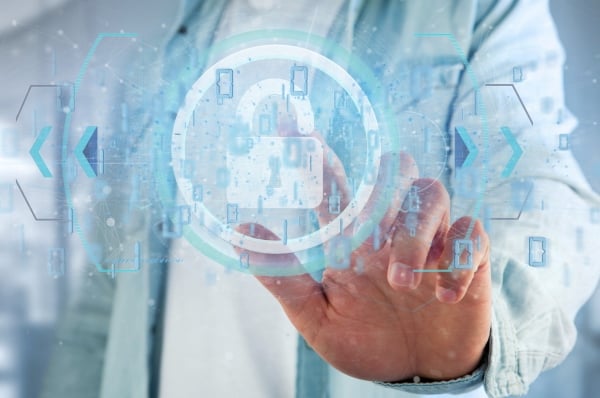By First Products on 9/21/23 7:30 AM
In a world where data is heralded as the new oil, the secure management and transparent transactions of healthcare data have never been more crucial. With the advent of blockchain technology, a novel pathway to achieving enhanced security and transparency in healthcare data transactions has been paved. Especially when coupled with mobile technologies, blockchain proposes a paradigm shift in how we handle healthcare data, ushering in a new era of secure and trustworthy transactions.
Blockchain, at its core, is a decentralized ledger that records transactions across many computers in a way that ensures the security of data and prevents its modification. This characteristic is particularly beneficial in a sensitive sector like healthcare, where the stakes are high regarding data integrity and security.
One of the paramount advantages of blockchain is its ability to provide a single immutable ledger as a reference for all transactions. Every entry is time-stamped and linked to the previous entry, creating a chain of blocks – hence the name blockchain. This feature is instrumental in reducing fraud, errors, and inconsistencies that can occur in healthcare data transactions.
Now, let's delve into the synergistic relationship between blockchain and mobile technologies in enhancing healthcare data management.
Mobilizing Blockchain for Healthcare
The ubiquity of mobile devices has significantly impacted many sectors, healthcare being no exception. Mobile technologies facilitate the easy access and management of health data, ensuring that patients and healthcare providers can interact seamlessly.
By integrating blockchain with mobile applications, a secure, transparent, and unchangeable ledger of transactions is created. This integration ensures that every data transaction is recorded and can be referenced easily, thereby promoting transparency and trust among stakeholders.
Here are some ways blockchain and mobile technologies are mobilizing secure and transparent transactions in healthcare:
Secure Patient Records:
By leveraging blockchain, healthcare providers can create a decentralized record of patients' medical history. When accessed via mobile applications, patients and authorized personnel can securely and conveniently access medical records.
Transparent Billing:
The billing process in healthcare can often be a convoluted one, riddled with errors and fraudulent activities. Blockchain can streamline the billing process by recording all transactions transparently, which can be accessed through mobile applications, ensuring clarity and trust.
Drug Traceability:
Counterfeit drugs and faulty supply chains are a menace to the healthcare sector. Blockchain, when integrated with mobile technologies, can provide a transparent and unchangeable ledger of drug transactions from manufacturer to patient, ensuring authenticity and compliance.
Consent Management:
Managing consent is a significant aspect of healthcare data management. Blockchain can provide a secure and transparent platform for recording consent, which can be easily managed and accessed via mobile devices.
Research Data Management:
The integrity of research data is crucial for advancing medical knowledge. Blockchain can ensure the authenticity and integrity of research data, which can be conveniently accessed and managed through mobile technologies.
Telemedicine:
As telemedicine becomes more prevalent, ensuring secure and transparent transactions between patients and healthcare providers is paramount. Blockchain can provide the backbone for secure telemedicine applications on mobile devices.

Future Implications
The integration of blockchain and mobile technologies holds promise for revolutionizing healthcare data management. As more healthcare providers and stakeholders recognize the potential benefits, a gradual shift towards adopting these technologies is inevitable.
Furthermore, as regulatory frameworks evolve to accommodate blockchain and mobile technologies in healthcare, a conducive environment for innovation and enhanced patient care will be fostered.
In conclusion, the amalgamation of blockchain and mobile technologies is not just a fleeting trend but a substantial stride towards secure, transparent healthcare data transactions. This integration is poised to redefine healthcare data management, ensuring that the sanctity of healthcare data is preserved while fostering trust and transparency among stakeholders.
Blockchain for healthcare data management is a burgeoning field with boundless potential. As we move forward, the melding of these technologies will undoubtedly play a pivotal role in propelling the healthcare sector into a new realm of data security and transparency.
_11wX8.5h-FINAL.png?width=721&name=FP-Logo-Horizontal-(COLOR)_11wX8.5h-FINAL.png)



comments